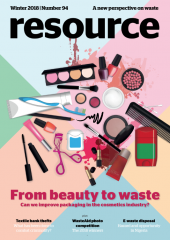Eye on the markets: Organic matters
Resource talks to Iain Pickles, Head of Sales at Biogen, about the state of the organics recycling market and its future outlook
The outlook for the organics recycling market is certainly one of noticeable contrasts and variations, and these have been brought into further relief in the past year.
One person uniquely placed to comment on the market situation for organics is Iain Pickles, Head of Sales for organics recycling company Biogen, who notes quite a distinct difference in how the markets for composting and anaerobic digestion have performed in recent times.

For composting, things have certainly been up and down over the past 12 months. “It's been a challenging year mainly because of the weather that we've had,” Pickles explains. “We've seen a decrease in inputs because of the hot summer, and that's obviously had an impact on facilities processing, though it’s not really had an impact so much on gate fees because those are generally agreed and contracted on a longer- term basis with local authorities.”
The situation for AD has proved to be equally challenging, as overcapacity has seen gate fees drop from around £25-30 per tonne in 2015 to almost zero for some AD operators in 2017 and 2018, mainly due to insufficient feedstocks. Pickles states: “Generally speaking the industry is experiencing quite acute overcapacity, particularly in certain regions. It is quite a regional market, in some areas there are more facilities than there is food waste available to process, which has resulted in the significant fall in gate fees for operators.”
This overcapacity challenge, according to Pickles, is particularly acute in the London and Home Counties area, especially Essex, Hertfordshire and Buckinghamshire.
“People have, not surprisingly, developed facilities in close proximity to London because clearly that is a major urban area,” he says. “There's a lot of food waste, not just from the household level but from commercial producers as well in terms of restaurants, hotels, and pubs.”
However, there is a lack of publicly available information on what is being produced from commercial businesses in terms of food waste, which means new facilities have often been built in areas where insufficient food waste is being collected to feed the AD plants – even where local authorities are separately collecting food waste, with significant amounts of organic material still ending up in the residual waste stream. This overcapacity has seen investment in new facilities slow – though 86 AD plants have applied for a tariff guarantee under the RHI – and an increase in mergers and acquisitions of existing facilities by operators.
Despite the dry summer, the composting sector is experiencing fewer issues than AD, due to its “settled and established” nature, and built-up knowledge of operators with regard to expected feedstock levels in their region. In contrast, “AD operators are still finding that they need food waste and will either offer zero gate fees or be transporting food waste a great distance to make sure that their plants are full.”
 This article was taken from Issue 94
This article was taken from Issue 94There is less trouble with the product that comes out the other end, however, especially if it is PAS 100 or PAS 110 standard – the quality standards for digestate and compost: “There is quite a healthy market as long as facilities are located in areas where there is a good demand for the material. Where the product is a good quality, farmers will pay for it because it's cheaper than using artificial fertiliser products and also much better for the environment.”
In light of the pressures listed above, where can we expect the organics market to go over the next 12 months? Despite calls to introduce mandatory separate collection of food waste in a bid to boost food waste recycling rates and AD inputs, Pickles doesn’t expect to see that introduced in the upcoming Resources and Waste Strategy, nor does he feel that it would be realistic or politically practicable for every council to introduce collections in the current climate of austerity.
“It would be quite controversial really, if local authorities are having to cut back on adult social care services or school budgets and all of a sudden they've been given £5 million to implement food waste collections,” he says. “I think that would be quite a difficult political decision for all.”
For composting, Pickles believes we might see a check on the expansion of sites as more councils introduce charges for garden waste collections, predicting that all councils will charge for garden waste by 2020 in response to the “austerity agenda”.
This might reduce inputs, as people are not always willing to pay for such a service. However, “as long as it’s communicated to the operator and the contractor that that is happening, they can balance the inputs from other sources”.






